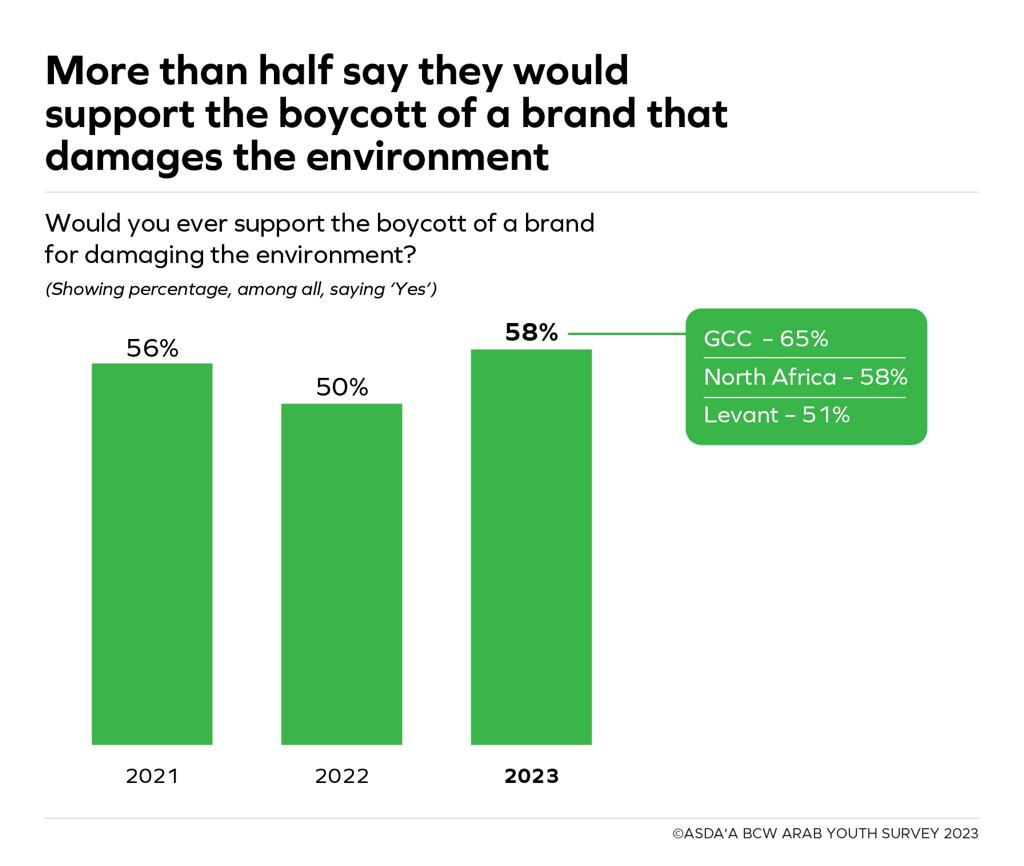• 71% of young Arabs say climate change is already impacting their lives
• 56% say their governments must set accountable targets to achieve Net Zero emissions
Riyadh, Saudi Arabia-: Three-quarters (75%) of Saudi youth say they are confident of their government’s ability to address the climate change challenge. This comes amidst increasing worry among Arab youth about the impact of climate change on their daily lives, with over two-thirds (66%), the highest percentage in five years, saying they are ‘very concerned’.
This comes amidst increasing worry among Arab youth about the impact of climate change on their daily lives, with over two-thirds (66%), the highest percentage in five years, saying they are ‘very concerned’.
These important findings from the 15th annual ASDA’A BCW Arab Youth Survey were announced today (September 21) to coincide with the Zero Emissions Day, an international day of action to secure a cleaner future and combat global warming.
The most comprehensive study of its kind of the Arab world’s largest demographic, its over 200 million youth, conducted by ASDA’A BCW, MENA’s leading communications consultancy, the survey this year evaluated the perceptions about climate change among Arab youth.
Underpinning the immediacy of climate change in the region, nearly three-quarters (71%) of all respondents said global warming is already impacting their life; this rises to 76% in the North Africa and 74% in the Gulf Cooperation Council (GCC) states, and about two-thirds (63%) in the Levantine countries.
A majority (87%) of Arab youth believe their government in taking positive action against climate change but more than half (56%) say their government should set transparent, accountable targets for achieving Net Zero emissions.
To date, only a handful of countries in MENA have set Net Zero targets, notably the GCC states (UAE, Saudi Arabia, Qatar, Bahrain, Kuwait, and Oman) and Iraq. Several other countries are investing significantly in renewable energy projects.
With the onus of addressing global warming being debated by developed and developing nations, less than half (42%) of youth in the region believe that Arab countries should be doing more than other nations to tackle climate change.
They are equally split on how to address global warming with 49% saying that people should change the way they live while 47% believe technological advancements is the solution. Majority of youth in the Levant (51%) and in the GCC (51%) vote for technology as the solution to the climate change challenge.
Most GCC youth (80%), however, say their everyday behaviour has an impact on climate change, compared to only 60% in the Levant and 58% in North Africa.
Sunil John, President, MENA, BCW and Founder of ASDA’A BCW, said: “The Middle East is home to some of the world’s largest energy producers and proven oil and gas reserves. This has positioned the Arab world at the heart of the global climate change dialogue. With Egypt hosting COP27 UN Climate Change Conference in 2022 and the UAE preparing to welcome the world for COP28 this year, the region is once again in the global spotlight.
“However, it is less reported that the MENA region also bears the severe brunt of climate change, with heatwaves and flash floods not only affecting livelihoods but also threatening social security and driving people to migrate to newer lands.
“Amidst all this, it is encouraging that the region’s largest demographic, its over 200 million youth, understand the implications of climate change. It is important that businesses take heed of their sentiment and make genuine efforts to minimise their environmental impact by aligning their values with the aspirations of the region’s youth,” John added.
The MENA region is one of the world’s most challenging ‘climate change hotspots’. According to reports, the region is warming twice as faster than the rest of the world, and temperatures are set to increase by at least 4 degree C by 2050, if greenhouse gas emissions increase at the current rate. Consequently, heatwaves are projected to be tenfold more frequent.
Since 1980, the region has witnessed thrice the number of natural disasters causing an average loss of US$1 billion per year, the most recent being the devastating flash floods in Libya, which the UN described as one that could have been avoided. The region is also one of the world’s most water-stressed, with water scarcity affecting food production, accelerating desertification and forcing population movements.
MENA has witnessed consistent drying in the last 20 years due to anthropogenic greenhouse gases. The region is also one of the most vulnerable to rising sea levels, which is expected to rise to 30 to 122 centimetres by the end of the century.
To support companies in their transformational journey to be more environmentally responsible, ASDA’A BCW has launched OnePoint5, a dedicated environment, social and governance (ESG) advisory that helps them address the “say-do” gap around ESG best practice, by combining the skills of experienced communicators with the technical abilities of sustainability specialists.
ASDA’A BCW commissioned SixthFactor Consulting, a leading research company, to conduct the 15th edition of the Arab Youth Survey. Face-to-face interviews were conducted with 3,600 Arab citizens aged 18 to 24 in 53 cities across 18 Arab states, the largest sample in the survey’s history. The interviews were conducted in person rather than online to maximise accuracy and to reflect the nuances of Arab youth opinion across the region as much as possible.
The overarching theme of the 2023 ASDA’A BCW Arab Youth Survey is ‘Living a New Reality’. Findings on five themes, ‘My Global Citizenship’, ‘My Politics’, ‘My Livelihood’, ‘My Identity’ and ‘My Aspirations’ were launched earlier. Findings under the theme, ‘My Lifestyle’ will be launched shortly. All the published findings are freely available with expert commentaries at arabyouthsurvey.com




